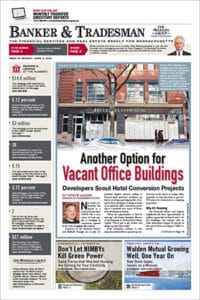
Industry experts and leaders expect next year to see consolidation among the state’s residential real estate brokerages. iStock illustration
It’s a tough time to be a Massachusetts residential real estate brokerage right now. Revenue is falling along with numbers of home sales, raising the prospect that not every firm will survive next year.
“At a time like this, you have to eat more pie. You have to figure out how to get more business,” said Larry Rideout, chairman and co-owner of Gibson Sotheby’s International Realty.
At its heart, the cause of the pinch is simple: The runaway real estate market of the last two years has come back to bite the industry, starving brokerages of both commission revenue and income from ancillary business like title services and mortgage referrals.
Rising mortgage interest rates have finally proved too much for Massachusetts after the pandemic buying spree pushed median home sale prices up by double-digit percentages from October 2019 to October 2022 – 33 percent in the case of single-families and 30 percent in the case of condominiums, according to The Warren Group, publisher of Banker & Tradesman. Single-family and condo sales combined were down 20 percent year-over-year in October, and by roughly the same margin over October 2019.
Leading indicators are similarly concerning.
This is the first in a two-part series examining the challenges and opportunities facing Massachusetts’ real estate brokerages in 2023.
Home showing foot traffic was off 58 percent year-over-year in the Northeast in October, the National Association of Realtors said.
Pending sales of single-family homes were off 10.2 percent in October year-over-year, and pending condo sales were off 14.3 percent, the Massachusetts Association of Realtors reported. Numbers of new single-family listings were down 17.1 percent and numbers of new condo listings were down 19.3 percent on the same basis.
Economists at brokerage and listings portal Redfin said last week they expect 16 percent fewer home listings next year nation-wide.
“There has to be some hunkering down,” said Anthony Lamacchia, broker-owner of Lamacchia Realty. “Everybody’s got to expect there’s going to be less sales, period.”
Eat or Be Eaten
These choppy waters came as the real estate market entered its normal seasonal slowdown, further restricting brokerages’ cashflow.
“The first quarter is going to be a challenge for everybody. Expenses still come in,” Rideout said. “Generally, in the fourth quarter, people move [on offers to buy their businesses], but we’re seeing a lot more right now.”
Bigger referral networks commanded by large brokerages like Gibson Sotheby’s, Rideout said, can offer a compelling argument to agents and brokerages at a time when sales leads are scarce.

Residential brokers and agents alike are looking to take greater market share away from their competitors even as market forecasts for 2023 stay gloomy.
These financial realities have some of the state’s larger brokerages on the hunt for acquisitions – provided the cultural fit is right.
“There are a lot of brokerages that are new and haven’t had a chance to build up a war chest yet,” said Charles Hunt, COO, Hunt Real Estate Corp., the parent company of Whitinsville-based ERA Key Realty Services.
And the median age of a residential real estate broker is 55, said Bernice Ross, a nationally syndicated real estate columnist, trainer and consultant, and more than a few Baby Boomer brokers may not be interested in slogging through another downturn.
Buying a new brokerage, particularly one with an office close enough to an existing one that they can be combined into one, often called a “walk-over,” is ideal, Hunt said. More gross commission dollars can be generated in the same market, without a substantial increase in overhead. Some brokerages might instead be looking to add an experienced independent broker to their leadership team by acquiring the latter’s business.
Smaller operations also have the option of affiliating their brokerage with a larger, national brand, Ross said, or merging into a team to lower their overhead.
“So many team leaders want their brand and their own place but they don’t want to worry about the back end. They don’t want to deal with [errors and omissions] insurance, they don’t want to have to deal with paying people, but they still want to brand themselves and have their own bricks and mortar,” said Leading Edge Real Estate CEO Linda O’Koniewski.
In response, Leading Edge spun up an affiliate program aimed at teams and small independent brokerages in early 2021, promising a “brokerage in a box” and the same custom marketing, technology and coaching that ordinary Leading Edge agents receive.
The nine-office firm now boasts three additional affiliate offices in Winchester, Beverly and Yarmouth Port.
A Spring Savior?
But some brokers are still having trouble adjusting to the market’s new direction.
“We’re very much looking to acquire, but a lot of brokerages still think it’s a year ago,” Lamacchia said, explaining that some have asked for valuations based on their performance during the pandemic home-sale boom instead of looking at their performance across three or four years.
And despite gloomy predictions coming from industry leaders, some are holding out hope for a robust spring.
“Inventory is at a point where it’s going to pick up dramatically in the early spring market because folks are worried they’ve missed the bus,” said Kyle Seyboth, founder of The Seyboth Team at Century 21.
Zillow senior economist Orphe Divounguy is skeptical of that possibility.

James Sanna
“There have been some recent signs that mortgage rates could be headed down as inflation cools, but it’s nearly impossible to predict the path forward, and any scenario in which rates fall back near 3% is very unlikely. Without a large income shock, I’m doubtful we’ll see a flood of sellers since the cost of a new mortgage will remain higher than one secured or refinanced when rates were much lower,” he said in an email to Banker & Tradesman.
Another possible scenario, said Guaranteed Rate loan originator Shant Banosian, is that a moderate decline in mortgage interest rates driven by the ongoing, slow decline in inflation could “create more excitement in the market.”
Many sellers are distracted by end-of-year holidays right now, he explained, and may have tuned out of real estate news when rates passed 7 percent in early November and could have missed subsequent declines.
“Bottom line: Life keeps going on,” he said. “At some point there’s pent-up demand in terms of needs [from births, deaths, divorces and job transitions] that you just can’t wait around for,” Banosian said.
“It comes back down to one thing only: How profitable are you, and do you have the cashflow to survive the downturn?” said Ross.





